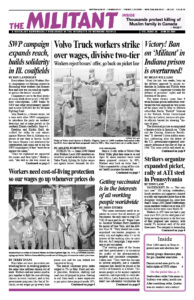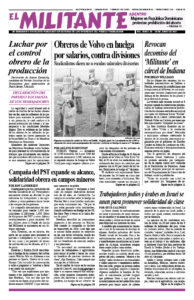Democratic Party politicians and their boosters in the liberal media have been posturing as the foremost defenders of the voting rights of working people, but the fact is their only interest is trying to jerry-rig the system to assure they retain power everywhere possible. One of their key goals is to close down ballot access for the Socialist Workers Party and others who aren’t candidates of the bosses’ two major parties.
Millions of workers and farmers, facing worsening working and living conditions, are looking for a new road forward and are increasingly open to alternatives to the Democrats and Republicans. This has made the Democrats — and the Republicans, when it serves their partisan interests — more determined to put roadblocks in the way of working people taking steps toward independent political action. Socialist Workers Party candidates call for working people to build their own party, a labor party, to fight to take political power into our own hands.
Democratic Party-run state legislatures, backed by cooperative court justices, have been imposing increasingly onerous ballot requirements on “third parties.” These include upping filing fees, raising the number of signatures that must be gathered on petitions, and pushing filing deadlines further and further away from the elections — sometimes into the year before!
New York a key offender
In New York state, Democratic Gov. Andrew Cuomo last year helped push through some of the most restrictive ballot-access laws nationwide. Among other things, he tripled the number of signatures required for statewide independent candidates to 45,000, while lowering the requirements for the two main bosses’ parties. These changes were upheld May 13 by U.S. District Court Judge John Koetl.
“New York now has the third highest number of signatures for a presidential candidate running outside the two major parties,” wrote Richard Winger in his Ballot Access News. “New York has the only prohibition on out-of-state circulators in the nation, for minor party petitioning. New York has the shortest petitioning period for general election presidential procedures” and “the third earliest deadline.”
The law also raised from 50,000 to 130,000 the number of votes a third party had to get to retain party ballot status in the next election. As a result, the Libertarian, Green, Independence and Serve America Movement parties lost their ballot access following the election last November. They’ll now have to petition and meet the new, more onerous, requirements to get a candidate on the ballot.
In Delaware, the long-time home of President Joseph Biden, the legislature made it more difficult for a new party to qualify for the ballot, moving the deadline from August to April 1. The new bill requires these parties to chose their nominees a month before the Democrats and Republicans have to announce theirs.
In Nevada, the legislature passed a bill May 31 pushing back to the end of April the deadline for new parties to file. The law also requires petitioners to get more signatures from all four U.S. House districts in the state. The bill’s sponsor, Sen. Roberta Lange, said these changes were needed to give election officials more time to check the petitions. (And search for excuses to turn them down!)
In Texas, Republican Gov. Gregory Abbott signed legislation May 26 that would force candidates of “minor” parties to pay new “filing fees.” These fees, which candidates running in primary elections had to pay for over 100 years, were struck down in 1972 by the U.S. Supreme Court, which said they amounted to a poll tax, a legacy of Jim Crow segregation.
The new Texas law also requires that candidates running for nomination in third-party conventions must pay a fee to the state before the convention even meets. The Democratic and Republican parties, needless to say, are exempt from this requirement.
“No state ever imposed a filing fee on someone merely seeking to be nominated at a convention” before, wrote Winger.
In a number of races this year, like in California where SWP candidates did manage to get on the ballot, they discovered that state authorities refused to list their party next to their names, instead putting “no party” down.
All these restrictions are aimed at making it as difficult as possible for the working class to chart its own course in politics. This, above all, is what the monied rulers fear — workers taking steps to fight for their own class interests and for all those who are oppressed and exploited by capital.
But working people will take this course, and, along the road, break down all the barriers placed in our path by the tiny minority of capitalist families who run the U.S. today.

